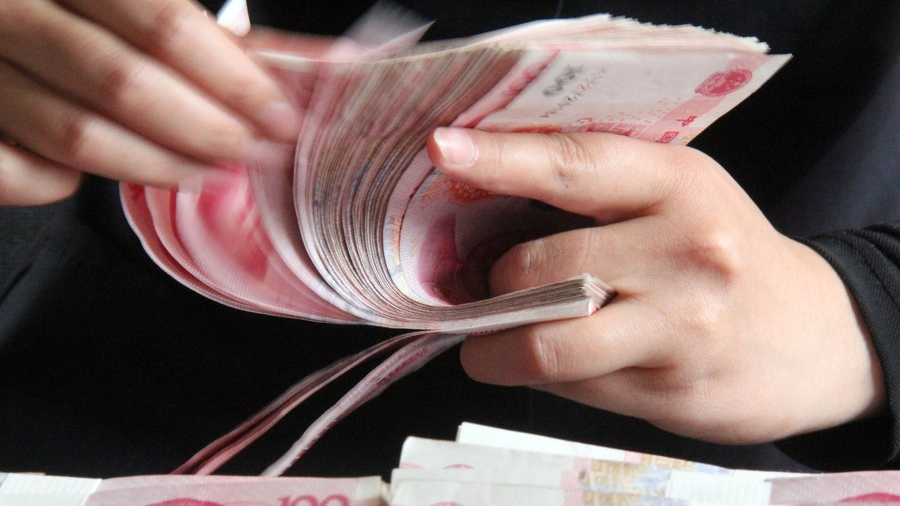Published: October 02,2023
By Imran Khalid

File photo shows a staff member of a Chinese bank counting cash. /Xinhua
On October 27, the Industrial and Commercial Bank of China (ICBC) marked a significant milestone by inaugurating a renminbi (RMB) clearing bank in Pakistan. The ICBC will provide an array of services, encompassing the clearance and settlement of cross-border transactions, as well as the facilitation of Chinese yuan-related activities such as buying, selling, borrowing, and lending for participating banks in Pakistan.
The same day, the People’s Bank of China (PBOC) also unveiled its 2023 Yuan Internationalization Report, which further corroborated the yuan’s impressive trajectory toward international recognition and acceptance. Since 2022, we have witnessed a strategic expansion in the establishment of yuan clearing banks across diverse global locales, including Laos, Kazakhstan, Pakistan, and Brazil. This concerted effort is aimed at enhancing the yuan’s overseas clearing network, aligning it with the evolving dynamics of international finance.
Notably, the yuan’s cross-border business capabilities have shown remarkable momentum. In the first nine months of 2023, the collective value of yuan cross-border payments surged to an impressive 38.9 trillion yuan ($5.32 trillion), signifying a 24 percent uptick compared to the previous year.
What is even more striking is the fact that yuan-based cross-border transactions now constitute a significant 24.4 percent of total cross-border payments encompassing both domestic and foreign currencies within the domain of goods traded. This marks a substantial 7-percent rise over the previous year.
This development certainly underscores the undeniable ascendancy of the Chinese currency as it surges forward in its quest for international recognition and utilization. All of this transpires amidst a worldwide movement to diminish the dominance of the U.S. dollar in international trade.
The ascent of the yuan is still in its nascent stage; however, the potential for its extensive utilization in offshore markets remains vast. This potential is firmly rooted in China’s economic prowess, which has shown remarkable resilience in recent years and its profound web of trade and business partnerships across the globe.
Notably, the Belt and Road Initiative has played a pivotal role in fostering these connections, drawing in a long list of countries and regions in a collective pursuit of growth and development. It is within this extensive network that the yuan stands poised to grow, becoming an increasingly acceptable instrument in international transactions and settlements.
The Chinese central bank has so far authorized 31 yuan-clearing banks in 29 countries and regions, achieving multi-faceted coverage on all continents. In September, the yuan reached a significant milestone by representing 3.71 percent of global payments by value, as per SWIFT data last week. This marks a remarkable jump from 1.91 percent in January, to a nearly twofold increase.
An increasing number of countries are queueing to engage in trade using currencies other than the dollar, alongside a deliberate diversification of their foreign exchange reserves. These initiatives are driven by a desire to mitigate U.S. dominance in the global financial arena.
For instance, Argentina has adopted the yuan to service its foreign debt obligations, and Pakistan is using the yuan to settle its expenses related to Russian crude oil. Such steps by developing countries indicate the acceleration of de-dollarization in the coming days, catalyzed in part by concerns surrounding the fiscal and monetary extravagances of recent years in the U.S.
Pakistan’s caretaker Minister for Finance, Revenue and Economic Affairs Shamshad Akhtar speaks during the opening ceremony of RMB clearing bank in Islamabad, Pakistan on October 27, 2023. /Xinhua
This adoption of the yuan for bilateral trade presents a win-win proposition for all stakeholders, driven by two compelling factors. Firstly, the yuan’s internationalization carries the potential to bring about transformative changes in China’s economic landscape. It is also expected to elevate the efficiency of China’s global trade initiatives, further propelling the growth of Chinese industries on the international stage.
Secondly, this shift can yield substantial benefits for countries and corporations embracing the yuan for settlements. It not only enhances trade efficiency but also acts as a safeguard against the erratic fluctuations in exchange rates concerning the U.S. dollar.
The fear of the U.S. using its currency to impose devastating sanctions on them, as it did on Russia, is also another reason behind this drive towards financial autonomy among the developing countries. This growing concern has led to a surge in de-dollarization initiatives as countries aim to safeguard their economic interests and protect themselves against potential future threats.
On the other hand, in tandem with Chinese economic growth, the yuan’s roles as an international reserve currency and payment currency are solidifying. An increasing number of countries are actively pursuing currency arrangements and building partnerships with China.
The PBOC has been consistently working to advance the internationalization of the yuan. This commitment is founded on market-driven principles and the autonomous decisions of enterprises. With a key emphasis on easing trade and investment, the PBOC appears to be intensifying efforts to bolster the infrastructure for yuan cross-border investment, financing, and transaction settlements.
Furthermore, the yuan’s role as a financing currency has been bolstered through a series of policies. These include domestic banks securing loans abroad and foreign institutions issuing bonds within China, collectively contributing to the ongoing enhancement of the yuan’s investment and financing landscape.
Imran Khalid, a special commentator on current affairs for CGTN, is a freelance columnist on international affairs.
cgtn.com
 Africa -China Review Africa -China Cooperation and Transformation
Africa -China Review Africa -China Cooperation and Transformation
